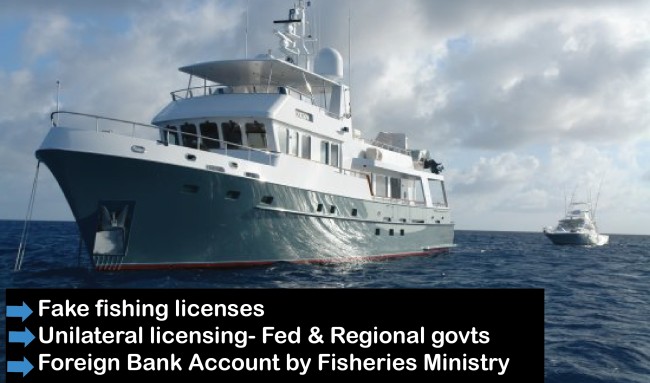Auditor General woes linked to crackdown on illegal fishing, UN Report

A UN REPORT attributes bad blood and strained relations between the Auditor General and mandarins at Villa Somalia to the former’s attempt to stymie illegal fishing on Somali waters by foreigners aided by networks of local cartels.
The UN Monitoring Group for Somalia and Eritrea, UNMGES, points to a scramble for proceeds from the country’s sea resources through a chain of cartels, forgery of fishing licenses and wiring of license fees to a bank outside the country contrary to the country’s laws and international practice.
Assault
On January 18 this year, the Auditor General Nur Farah was prevented from entering his office at Villa Somalia and was reportedly assaulted by security guards forcing him to take cover in the foot well.
Three days before, the UN Report notes, a Yemeni vessel- Al Amal holding 70 tonnes of catch in its hold had been released supposedly by orders from ‘upper management’ after it was detained in the port of Mogadishu upon which it was found to have been operating under a fake license.
The Auditor General had inspected it and found to have been fishing illegally in the country’s Exclusive Economic Zone, EEZ. But attempts by the Auditor General to detain it for subsequent prosecution failed after the vessel was released shortly. The Group says the Attorney General
Ahmed Ali Dahir said the Al Amal had entered Mogadishu to buy fish from local markets, and that the vessel possessed both a valid Puntland license and a “general trading license” issued by the Federal Government.
Irregular licensing
This development points to a system ridden with unmitigated attempts for personal gain at the expense of the country’s resources.
The licensing of vessels features prominently as a matter of concern for the Monitoring Group which points to irregular issuance of fishing licenses to foreign companies by both the Federal Government and State governments in a manner which violates every aspect of the law.
In one of the agreements between the Federal Ministry and a Chinese company Doggang Daping Enterprises Group, the Report singles out a case where the Chinese company would have been handed a 7 year exclusive right to purchase licenses for up to 50 trawlers or purse seiners, while prohibiting other companies of Chinese origin from engaging in fishing activities in Somali waters.
The draft agreement which had not been signed by the time the Monitoring Group published the report also gave Doggang permit to fish within six nautical miles from shore, as well as trawl for demersal species such as octopus and scallops.
Agreement
“The clause twice violates the FGS’ own 2014 Fisheries Law, which requires foreign fishing vessels to remain at least 24 nautical miles from shore in order to avoid encroaching on local fishermen; the Law also prohibits the practice of bottom trawling,” says UNMGES
In addition, the paragraph contravenes an April 2014 agreement between the FGS and Puntland, Galmudug, and the IJA, which held that coastal demersal stocks were to be managed at the regional, not federal, level.
The Chinese company would also pay $70,000 to the Ministry as part of ‘capacity building’ similar to the Capacity Building Agreement between the Petroleum Ministry and the British extractives company Soma Oil and Gas.
The payment of license fee to the Ministry of Fisheries through a bank account in Djibouti also raises more questions on the good intentions of the ministry. Fiscal procedures in government stipulate that all finances to the government must be channeled through the Single Treasury Account at the Central Bank. However, as pointed out in several sections of the report, ministries almost always overlook this provision.
READ ALSO: 5 years port fee swindled in 7 days, UN Monitoring Group Report
The Somalia Oil Conundrum: Questionable deals and double salaries
In May this year, a Taiwanese agent, Howard Tan paid a sum of $180,000 to the Ministry of Fisheries for licenses and penalties for seven China-flagged long liners which had been detained for illegally fishing in the country’s EEZ.
But instead of the funds going to the ministry’s Central Bank Treasury Single Account, the amount was deposited in a Dahabshiil bank account in Djibouti.
Shortly the funds were wired to the Central Bank of Somalia and subsequently withdrawn, says the report.